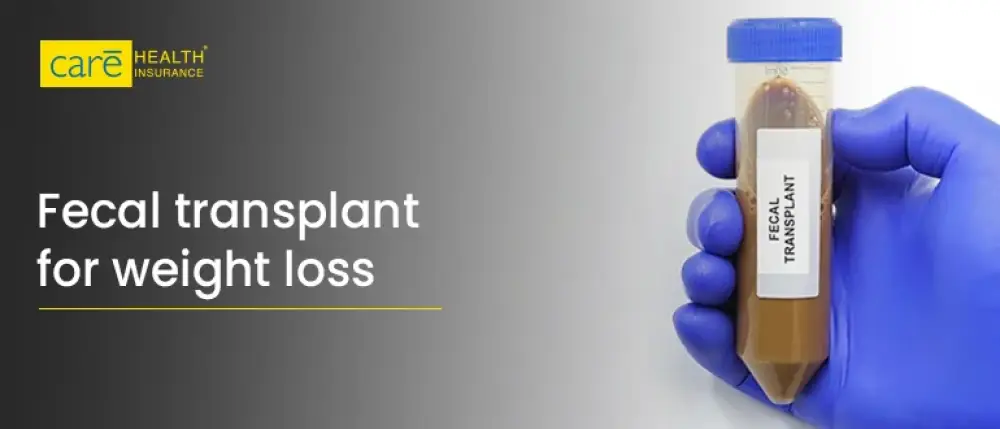Subscribe to get weekly insights
Always stay up to date with our newest articles sent direct to your inbox
Published on 3 Nov, 2025
Updated on 3 Nov, 2025
77 Views
3 min Read

Written by Pratham Gupta
Reviewed by Ritika Malik
favorite0Like
favoriteBe the First to Like
Have you ever heard of the phrase, “You are what you eat”?
Well, science is now telling us something even more fascinating: You are what your gut bacteria eat and do.
When it comes to weight loss, most of us think about diet, exercise, and supplements. Researchers have been exploring an unusual and somewhat surprising treatment, Fecal transplant, for weight loss. Yes, you read that right. It’s about transplanting healthy gut bacteria from one person’s stool into another’s body to restore balance in the digestive system.
Sounds strange? Absolutely. But is it effective?
Let’s break this down in a simple, conversational way so you can understand the fecal transplant procedure, its potential benefits, costs, and, of course, the possible risks.
A Fecal transplant (also called Fecal microbiota transplantation, or FMT) is a medical procedure in which stool from a healthy donor is processed, tested, and then transplanted into the gut of a patient. The idea is to replace the patient's unhealthy gut bacteria with healthier ones from the donor.
Most commonly, FMT is used for treating Clostridioides difficile infection (C. diff), which causes severe diarrhoea and is resistant to antibiotics. However, researchers are now looking at how a Fecal transplant works for other conditions—like obesity, diabetes, and even mental health.
Think of your gut microbiome as a bustling city. Some bacteria help digest food, extract nutrients, and regulate metabolism, while others can cause inflammation and weight gain if they overgrow.
When the microbiome is out of balance (called dysbiosis), it may lead to:
Here’s where Fecal transplant for weight loss comes in. By introducing healthy bacteria from a lean donor, your gut environment may “reset,” improving how your body processes calories and fat. Early research suggests that people who receive transplants from lean donors may show improved insulin sensitivity and even modest weight loss.
If you’re wondering how doctors actually perform this treatment, here’s a breakdown of the Fecal transplant procedure:
Healthy donors are carefully screened for infections, diseases, and gut health.
The donor’s stool is collected, processed, and converted into a liquid solution after unwanted particles are removed.
The procedure usually takes under an hour and is generally safe when performed by trained professionals.
While weight loss is still under investigation, several Fecal transplant benefits are already proven:
For people struggling with obesity, restoring gut balance may not only help shed pounds but also reduce risks of related conditions like diabetes, fatty liver disease, and heart issues.
Like any medical procedure, FMT isn’t risk-free. Some potential risks of stool transplant include:
This is why it’s critical to have the procedure performed under expert medical supervision, not attempt anything DIY.
In India, the Fecal transplant cost can range anywhere between ₹30,000 to ₹70,000 per session, depending on:
Since weight loss via FMT is still an experimental treatment, many insurers may not yet cover it. However, if you’re undergoing the transplant for a medical condition like C. diff, some policies may provide partial coverage.
Current research is promising but still in its early stages. Clinical trials suggest that:
In simple terms, while Fecal transplant for weight loss looks like an exciting new frontier, it’s not a replacement for healthy eating, exercise, and medical care. Think of it as a supportive tool, not a magic wand.
>>Read More: Does Health Insurance Cover Surgery
The idea of using someone else’s gut bacteria to shed extra kilos may sound strange, but science is showing us that our microbiome plays a decisive role in weight management. While Fecal transplant for weight loss is still in the research stage, it holds promise as part of a holistic approach to health.
That being said, don’t forget the basics: a balanced diet, regular exercise, and stress management are the foundation of effective weight control.
And if you’re thinking about advanced medical procedures like this, financial protection matters. With Care Health Insurance, you can be worry-free about the costs of gut-related treatments, hospital stays, and other medical needs. Your health deserves the proper care, and Care Health has you covered.
Disclaimer: All plan features, benefits, coverage, and claims underwriting are subject to policy terms and conditions. Kindly refer to the brochure, sales prospectus, and policy documents carefully.
favoriteBe the First to Like
Thyroid : मामूली नहीं हैं महिलाओं में थायराइड होना, जानें इसके लक्षण और घरेलू उपचार Vipul Tiwary in Diseases
शुगर कंट्रोल कैसे करे? जानें, डायबिटीज में क्या खाना चाहिए Vipul Tiwary in Health & Wellness
हाई ब्लड प्रेशर को तुरंत कंट्रोल कैसे करें? देखें इसके उपाय Vipul Tiwary in Diseases
पैरों में दर्द किस कमी से होता है? जानें, इसके घरेलू इलाज Vipul Tiwary in Health Insurance Articles
Navigating Body Changes After Uterus Removal Leena Khowal in Surgery
Anaesthesia Allergy: How to Stay Safe During Surgery Sambriddhi Sharma in Diseases
Liver Transplant: Cost, Insurance & Success Rate Sambriddhi Sharma in Surgery
Is Sciatica Surgery the Only Option for Back Pain? Things You Need to Know Sejal Singhania in Surgery
When performed in a medical setting with proper donor screening, it is generally safe, though still considered experimental for weight loss.
It restores balance in gut bacteria, which may improve metabolism, reduce fat storage, and influence appetite.
The cost ranges from ₹30,000 to ₹70,000, depending on the hospital and procedure method
Yes, especially for treating gut infections, and potentially for improving metabolism and immunity, though research on long-term weight effects is ongoing.
Possible risks include infection, abdominal discomfort, or allergic reactions, but these are rare with proper screening and expert handling.
Always stay up to date with our newest articles sent direct to your inbox
Loading...